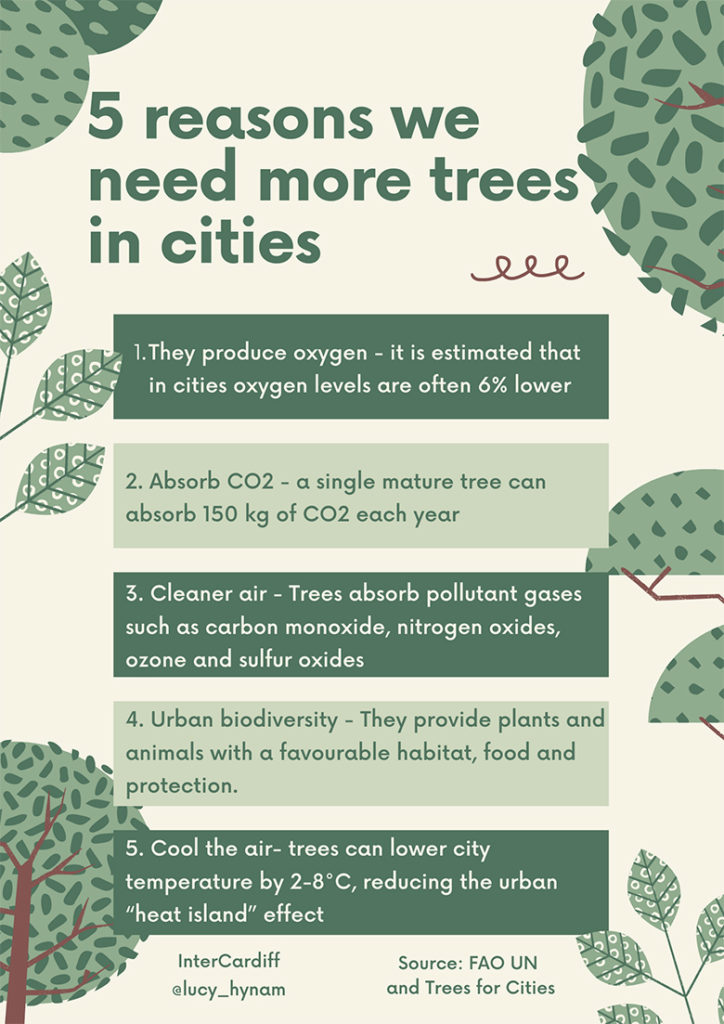Cardiff Council has received a £200,000 grant to plant 800 hectares of trees across the city. What is Cardiff doing to reach its Carbon Zero plans?

As someone who grew up in the Scottish countryside surrounded by trees, Cardiff university student Rebecca Brady finds it overwhelming sometimes to live in such a busy, polluted city. As she leaves her house, she is reminded that in Cardiff she cannot step outside her door without breathing in polluted air. The streets are constantly full of cars she explains, even at 3 am.
“At home, the air quality is so much better, so I have plenty of time alone with my thoughts to process things and enjoy nature,” said Rebecca.
Trees are essential within a city and many like Rebecca welcome the news that more trees are being planted in Cardiff with open arms.
“For me, going to a park or even walking down a quiet street lined with trees makes me think of peaceful places and for a while, I feel relaxed rather than constantly tense,” said Rebecca. “I think it’s great that Cardiff is trying to improve its air quality.”
Trees in Cardiff are not only essential for its residents’ mental health but also its environmental impact. In October 2020, Cardiff Council revealed its plans to become fully carbon-neutral by 2030. Their ambition is to increase their urban tree cover from 18.9% to 25%.

“That’s why, as well as significantly increasing the number of trees we plant, we’ll also be using some of this funding to help establish a tree nursery to secure a stock of locally grown, native trees we can plant in the future,” said Peter Bradbury.
With a £228,862 grant from Coed Cadw, The Woodland Trust in Wales, Cardiff Council hope to plant more than 800 hectares of trees over the next decade.
Peter Bradbury, Cardiff Council Cabinet Member for Culture and Leisure, said: “Securing this funding from The Woodland Trust gives our plans for a greener Cardiff a real boost – it’s going to make a real difference as we continue working towards our vision for a carbon-neutral, One Planet Cardiff.”
Across the UK up to £3.4 million will be given to councils. It is an essential part of the Woodland Trust’s aim to plant 50 million trees by 2025.
Natalie Buttriss, director of Coed Cadw said: “Among the aims of the Emergency Tree Fund are to boost green spaces for health, plant trees to soak up harmful carbon and combat pollution and create detailed strategies to meet carbon zero targets.”

Tree planting is essential in Cardiff as Wales is one of the least wooded countries in Europe, with only 15% of the land covered in trees compared to the European average of 37%.
The impact of climate change is a topic that hits very close to home as research suggests that Cardiff will be the 6th most impacted city by global warming. It is estimated that Cardiff may see sea level rises of as much as 1.13 metres by 2100.
“Whilst tree-planting alone is not a ‘silver bullet’ for tackling climate change, we are pleased to be supporting Cardiff Council in taking action to identify land for trees and to increase canopy cover across the city,” said Natalie Buttriss.
Alongside other action in areas such as transport, energy and food, planting trees is an essential strategic response to the climate crisis Cardiff may face. These trees are vital for lowering Cardiff’s carbon emissions as one single mature tree can absorb 150kg of CO2 each year.

“That’s why, as well as significantly increasing the number of trees we plant, we’ll also be using some of this funding to help establish a tree nursery to secure a stock of locally grown, native trees we can plant in the future,” said Peter Bradbury.
Cardiff Council has also begun to try to rewild the city by installing two ‘green walls’ on buildings. With the aim to improve air quality and biodiversity in areas where there is little to no green space.
Peter Bradbury, said: “These green walls will provide valuable support for wildlife, and studies have shown that they can also help improve local air quality.”
The two walls have been fitted to Dusty Forge Community Centre in Ely and Kitchener Primary School in Canton. The Ivy filled screen will assist Cardiff in its Carbon Zero goals by removing harmful pollutants from the air and supporting a wide range of native pollinators by providing them with hibernation sites and sources of winter food.
It hasn’t yet been decided where the trees will be planted. “Ahead of the tree planting season re-starting in the autumn, we’ll be finalising our plans for this funding, looking at exactly where and what type of trees we will be planting, as well as how this project will dovetail with other, major tree-planting schemes, that are also currently being developed,” said Peter Bradbury.
